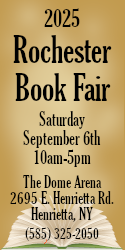A Book Club of One
Note: The baying of the hounds from both sides of the aisle is a reminder that the quadrenniel political season is well under way, and what better excuse to reprint our review of Ray Ginger's biography of Eugene Debs, the labor reformer, socialist and ultimately crusading populist and pacifist who was convicted and sent to jail for his public speech.
*
The oldest book club I remember was the “Book-of-the-Month” club. My parents subscribed, which is how I first was introduced to Winston Churchill's 6 volume memoirs of World War II. Each volume, as published, may have been offered as a bonus to new members.
And while in boarding school in Connecticut, a faculty member promoted something called the “Book Find Club” where students interested in history, economics and philosophy could order new books from BFC catalogues at prices which seemed ridiculously low even at that time. Like a starving person at a Chinese buffet, I usually bought more than I could read before the next catalogue arrived.
One I remember reading almost immediately (biography refracted through the lenses of history, economics and philosophy) was Robert L. Heilbroner's The Worldly Philosophers. It was an expanded version of his PhD. dissertation and apparently was so successful that it was revised and reprinted several times. It is still widely offered on the internet by online sellers: “The Worldly Philosophers is a beautiful novel written by the famous author Robert L. Heilbroner. The book is perfect for those who wants to read philosophy, history books. The main character of the story are John Maynard Keynes, Adam Smith, David Ricardo, Thomas Robert Malthus, Thorstein Veblen” [sic]. Seriously, I kid you not.
At any rate, book clubs have proliferated over the years. Television personalities publicized eponymous ones, promoting books, often of the “as-told-to” genre, and almost immediately day time television watchers would order them on Amazon or head to the nearest Costco. There are also local book clubs that meet in libraries or in each others homes, where members take turns making selections. And at the height of the Pride & Prejudice craze some years ago, Book Source Magazine helped to publicize a “Jane Austen” book club – as I recall it ran out of steam after Northanger Abbey or Mansfield Park. With the demise of traditional bookstores, many of which stocked backlist titles on their shelves for years, of necessity the trend has been toward self-publishing or what used to be called “vanity press” publication. At its most embarrassing it can involve being invited to a gathering to hear an author speak about his or her book, while feeling the pressure to buy autographed copies at the conclusion of the talk. Rare unsigned copies of anything seem to be at a premium of late.
While some book clubs promote the idea of thousands of people reading the same book at the same time – I find myself more intrigued by the notion that sometimes I might be the only person on the planet reading whatever it is I'm reading at the time. Right now that book is The Bending Cross, a Biography of Eugene Victor Debs by Ray Ginger (New Brunswick: Rutgers University Press, 1949). My copy is one of my teen-aged “Book Find Club” purchases from decades ago and a book I recently re-discovered among the thousands of others shelved, sometimes two deep, throughout our home and office.
Eugene Debs parents were born in the Alsace and emigrated to New York in 1849. The father, Jean Daniel, the well-educated son of a textile mill owner with a taste for French and German romanticism (later naming his son Eugene Victor after Eugene Sue and Victor Hugo), ended up emigrating to the United States when his parents weren't too keen on his intended marriage to Marguerite Bettrich, a worker in one of his father's mills. They ended up nearly penniless in Terre Haute (Indiana) where Jean Daniel worked several jobs as a laborer, including laying ties on the Vandalia, the first railroad to travel through the town. But it wasn't too long before Daniel would achieve a modest level of prosperity when he went into the grocery business. Eugene read widely and learned both German and French from his parents (much of which he forgot later in life) and his first job, as fate would have it, was as a fireman on a steam locomotive, ultimately leading to his involvement with craft unions, industrial unions, and finally as one of the earliest promoters and organizers of the Socialist Party.
The earliest labor unions were essentially craft unions, in all probability inspired by the European guilds, but with one important difference – members of the “worshipful company” of silversmiths, glove-makers or whatever, owned the tools of their trade. In the new factory system they did not. Deb's job as a fireman and membership in the BLF (Brotherhood of Locomotive Firemen) was his introduction to the industrial revolution. Incidentally, the engineers, brakemen, switchmen, conductors and baggage handlers all had their own brotherhoods, sometimes working at odds with each other. Wildcat strikes were easy to organize, but often easier to break.
Ginger's style is sometimes adulatory and worshipful, and at other times incisive and analytical when he explains how and why Debs evolved over the years. At first Debs believed in working within the various brotherhoods and craft unions – and had yet to part company with the likes of Samuel Gompers (AFL), the Knights of Labor and other reformers, but it wasn't long before several momentous events changed him to the core.
In July of 1892, while the Coeur d'Alene (Idaho) silver miners' strike was being crushed by Federal troops, eight thousand Pennsylvania militia and Pinkerton agents were ordered into Homestead, Pennsylvania to enforce the lockout at Carnegie Steel and effectively destroy the Amalgamated Association of Iron and Steel Workers. Andrew Carnegie and Henry Frick (nowadays known for their conspicuously virtuous patronage of libraries and the arts) were not exactly friends of the common folk. In many ways the elites of yesterday were very much like the “elites” of today, with the Jekyll Island of the 1890s being replaced by Davos.
By that time Debs had been using The Magazine, a publication he wrote for, edited and published for railroad workers to rail against the injustices he'd seen at first hand – “If the year 1892 taught the workingmen any lesson worthy of heed, it was that the capitalist class, like a devilfish [sic], had grasped them with its tentacles and was dragging them down to fathomless depths of degradation... To escape the prehensile clutch of these monsters, constitutes a standing challenge to organized labor in 1893...” Strong words indeed.
And two years later, during a general economic depression, Debs was at the very center of the Pullman boycott, called the “Debs Rebellion” by many newspapermen and editorial writers of the time.
The Pullman Palace Car Company was organized by George Pullman and was based in the eponymous Chicago suburb of Pullman, Illinois. In organization it suggested the blend of a 15th century manorial estate, a southern sharecropping plantation and Apple's overseas iPhone factory operation (Foxconn) in Zhengzhou, China. Pullman was a purpose-built community, with homes, schools, library, stores, cemetery, etc., all owned by George Pullman. Workers rented company-owned homes, bought food at the company store, paid annual dues to use the library and schools, and were left with little discretionary income. During the 1894 depression one of Pullman's skilled workers was reported to have worked ten hours a day for twelve days and after $9.00 rent was deducted from his $9.07 paycheck, was left with seven cents. Workers and their families were barely surviving and as the depression of 1894 continued, the situation only worsened.
While the Pullman boycott and strike was dragging on during the summer of 1894, the Pullman company employed a novel strategy. Although the strikers and boycotters were mainly focused on preventing the movement of passenger trains with Pullman sleeper cars, by attaching mail cars to those trains management could accuse strikers of obstructing the U.S. mail, a federal offense, thereby placing labor leaders and the rank and file firmly in the sights of Federal prosecutors. Which is what happened. Long story short, Debs was tried and convicted of violating the labor injunction and ended up doing time in the McHenry County Jail in Woodstock, Illinois.
After 1894 Debs lost confidence in labor's ability to bargain collectively within the capitalist system, and he became a true-believing Marxist almost overnight. As with any ideology, rose-tinted sunglasses are standard equipment but in the 1890s Communism was just a theory without a history or sad trail of human experience.
Debs felt betrayed by Benjamin Harrison, a Republican in 1892 and by Grover Cleveland, a Democrat, in 1894, and announced publicly – “I am a Populist, and I favor wiping out both old parties so they will never come into power again. I have been a Democrat all my life and I am ashamed to admit it. I want every one of you to go to the polls and vote the People's ticket.”
From that point on, Deb's politics became an amalgam of Populism and a romanticized vision of Marxism. He ran for President on the Socialist Party line in 1908 and again in 1912. Despite a grueling cross-country whistle stop campaign on the “Red Special” and speaking before enthusiastic crowds numbering in the tens of thousands, the official vote tally was just shy of five hundred thousand votes. Some contemporary observers claimed that the vote count was unrealistically low due to irregularities at the polling places. In 1912 Debs reluctantly ran again and received nearly nine hundred thousand votes – nearly doubling the 1908 total.
In the years prior to the United States entering the World War on the side of the allies opposing Germany, Deb's deeply ingrained populist and pacifist instincts informed nearly all of his public speaking and writing. So much so that many of his publications (An Appeal to Reason, The Masses, etc.), were effectively censored by being denied 2nd class mailing privileges – nowadays that would be equivalent to being banned from Twitter or other online platforms.
Public speaking engagements were still open however, and Debs gave an especially stirring anti-war speech to those attending the Socialist Party convention in Nimisilla Park in Canton, Ohio on June 16, 1918. He spoke for two hours while federal agents moved through the crowd, taking notes, checking draft cards, etc. Using irony, that most powerful of weapons, to point out how Teddy Roosevelt, the Kaiser and other elites vacationed together in Potsdam in 1907 and at other times and places, Debs gradually got to his main point – “The master class has always declared the wars; the subject class has always fought the battles. The master class has had all to gain and nothing to lose, while the subject class has had nothing to gain and all to lose – especially their lives...” Thirteen days later he was indicted on violations of the Sedition Act, tried, convicted, and sentenced to time in Federal prison.
As a personal observation, I find it interesting that rumblings of the need for more military involvement on today's international scene seem to come mainly from the more plutocratic zip codes, while current anti-war sentiment, suggested by reports of a decline in successful military recruiting efforts, especially from predominantly working class and rural areas of the country, has been on the rise. If true, I find myself heartened by the trend. But if this becomes a serious problem for policy makers of the administrative class, perhaps their more fortunate sons and daughters (who probably never heard of John Fogerty or CCR) will be available to pick up the slack.
Despite his strongly anti-war sentiments, in an unavoidable military conflict I suspect Debs would have advocated for Alexander the Great's approach, which was to target the leadership or “go for the head.” In centuries past, kings and their like were usually on the battlefield and easily identifiable by the accoutrements of royalty surrounding them. In short, by destroying or capturing an opposing king or commander-in-chief as quickly as possible, Alexander's purpose was to end battles more quickly, thereby saving the lives of countless foot soldiers on both sides. What a wonderful idea. Who but an irredeemable elitist could argue with that?
***
Although online book-searching sites are useful for finding the book you're searching for, antiquarian bookshops and both public and private libraries are magical places to discover books you had either forgotten about or never knew existed.
Unexpectedly discovering books at hand is the happy result of a lifetime of book-buying and because, unlike fish, they don't have sell-by dates, the tendency among bookish folk is to buy at a pace that exceeds anyones ability to read. And after a few decades, the scent remains pleasant.
Since beginning this piece a few days ago I came across, almost buried in my fairly substantial Mencken stash, a copy of Happy Days [New York: Knopf, 1940], a personal memoir of his growing up in Baltimore in the 1880's. Couldn't help wondering if at the same time someone else might be reading the very same book – or maybe I'm the only member of the Book Club of One.


























